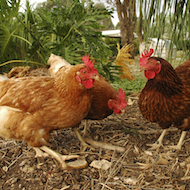
Panel of global poultry experts to judge award
Nominations are now open for the World Veterinary Poultry Association's (WVPA) young poultry veterinarian of the year award.
The award is open to veterinary surgeons specialising in poultry, who were under the aged of 35 as of January 1this year.
The winner will be given the equivalent of $5,000 towards attending international scientific or CPD meetings.
The WVPA is looking for a young veterinary surgeon who has not only displayed a commitment to bird health and customer care, but who demonstrate a real passion for the poultry industry.
Dr Trevor Bagust, President of the WVPA said: "The two previous winners have been exceptional young veterinarians who are a credit to our profession.
“We have been very impressed by the standard of nominations in the past, and I expect 2014 to be the same or even better.”
A panel of global poultry experts will judge the award and the winner will be presented with his or her award at the WVPA Asia Meeting in Bangkok in September.
Hector Badillo, Global Marketing Director for award sponsor, Zoetis, believes that encouraging young veterinarians is important for the future of the poultry industry.
“Maintaining the health and therefore the productivity of flocks is absolutely central to the success of modern poultry businesses, and veterinarians are an essential part of that success,” he said.
Nominees/applicants are asked to demonstrate their role and achievements in the industry and explain why they believe they should win the award in 500 words or less.
The closing date for nominations is May 16. Entries can only be made via the WVPA Young Veterinarian of the Year 2014 website at wvpa-award.com
Full details on the award are also available on the website.



 HMRC has invited feedback to its communications regarding the employment status of locum vets and vet nurses.
HMRC has invited feedback to its communications regarding the employment status of locum vets and vet nurses.